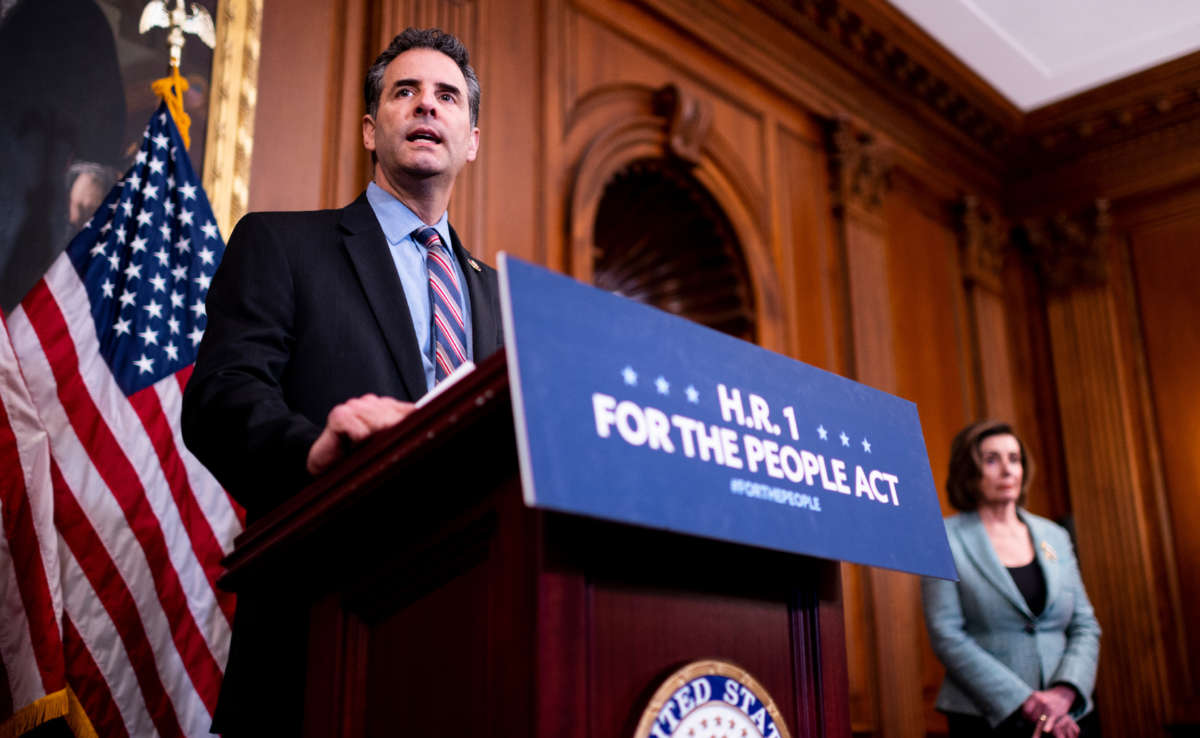Rep. John Sarbanes (D-Maryland) announced on Monday that all House Democrats have now co-sponsored the 2021 version of the For the People Act, or H.R. 1. House Democrats have said that they will hold a vote on the legislation during the first week of March.
H.R. 1 is a sweeping election reform act that is a bundle of election- and voting-related laws, and it’s been favored by Democrats and progressives for several years now. The law targets corporate campaign finance by exposing “dark money” campaign contributions and ending the Citizens United ruling that unleashed massive amounts of corporate spending in politics.
It also greatly expands voting access by automatically registering eligible voters; making Election Day a holiday for federal employees and encouraging the private sector to do the same; and curbing partisan gerrymandering — which gives Republicans who are in control of a majority of state legislatures an advantage — and voter roll purging. In other words, as many journalists and political experts have said, it could save democracy.
Democrats passed the bill in the House in 2019, but then-Majority Leader Mitch McConnell refused to bring it to a vote in the Senate. Republicans — and many organizations that support them in their campaigns — are opposed to the bill.
“Our democracy is in a state of deep disrepair,” said House Speaker Nancy Pelosi (D-California), House Administration Chair Zoe Lofgren (D-California) and Democracy Reform Task Force Chair Sarbanes in a statement when they reintroduced H.R. 1 in January. “Across the country, people of all political persuasions — including Democrats, Independents and Republicans — are profoundly frustrated with the chaos, corruption and inaction that plague much of our politics.”
The lawmakers also point out in their statement that 2020 was a particularly fraught year for elections. Former President Donald Trump and the Republican Party fought hard to undermine and question the election and its results. Those unprecedented attacks on the election have now led to a huge wave of bills introduced in states by Republicans seeking to restrict voting rights.
The Brennan Center for Justice has found that, as of this month, over 165 bills that seek to limit voting have been filed in states, as compared to only 35 at this time last year. They are particularly aimed at limiting mail-in voting, imposing stricter voter ID requirements, restricting voter registration and expanding voter roll purging.
Efforts to limit voting have been particularly egregious in Georgia which turned blue in the most recent election and where Black voters, in particular, were instrumental in clinching the Democrats’ victory. Last month, a Republican lawmaker there attempted to pass a bill that would require voters to send in two copies of their ID when requesting an absentee ballot.
On Friday, Georgia Republicans filed legislation that proposes sweeping changes to election laws as well as further restrictions to absentee and early voting. It would impose more restrictions on voter IDs when requesting an absentee ballot and limit the window for voters to request and counties to send out the ballots. It also prohibits counties from conducting early voting on Sundays, which NPR reports is traditionally a day with more turnout from Black voters through “souls to the polls” events.
The Nation said that this drive from Republicans to limit voting is voter suppression that is, in many cases, specifically aimed at Black voters. “At the beating heart of the Big Lie — the deranged fantasy that the 2020 election was stolen from its loser, Donald Trump — is the Republican belief that the votes of Black people shouldn’t count,” wrote The Nation’s Elie Mystal. “The new laws cover everything Republicans could think of to make it harder for people to cast a vote.”
Republicans seem to be specifically targeting mail-in voting and early voting after many states opened both massively to avoid crowds and gathering on election day because of COVID-19. These bills follow the many attempts by Republicans to quash voting before the election last year where they tried every which way to limit who could vote, as well as when and where they could vote.
Polling shows, however, that the expanded voting access in the 2020 election due to COVID was quite popular among voters from both parties. Seventy percent of voters support the adoption of no-excuse absentee voting that many states allowed last year and two-thirds support expanding early voting periods before the election, according to a new poll by Strategies 360 and Voting Rights Lab.
H.R. 1 also enjoys wide support among the public; according to polling from Data for Progress and Equal Citizens, 67 percent of Americans support the legislation, including 77 percent of Democrats and 56 percent of Republicans.
Media that fights fascism
Truthout is funded almost entirely by readers — that’s why we can speak truth to power and cut against the mainstream narrative. But independent journalists at Truthout face mounting political repression under Trump.
We rely on your support to survive McCarthyist censorship. Please make a tax-deductible one-time or monthly donation.
